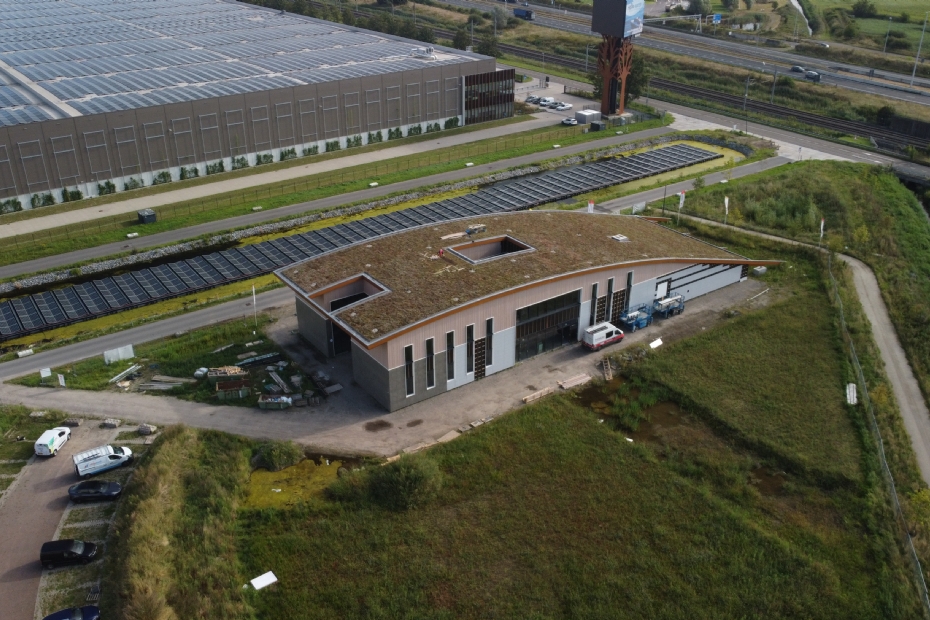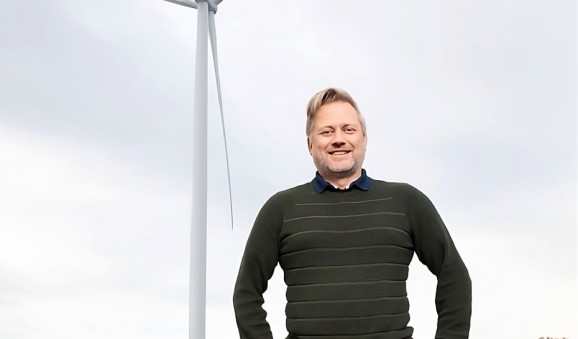BCT gains recognition as the Greenest Business Park in the Netherlands:

‘This award is a recognition and appreciation of our efforts’ “Business Centre Treeport (BCT) sets a remarkable standard for how business parks can contribute to a greener future,” declared the jury when naming the Greenest Business Park in the Netherlands for 2024. The accolade was announced during the Day of Economic Affairs hosted by Stichting CLOK. Overjoyed with the recognition, BCT now shifts its focus to further preparation for construction at its sustainable business park. "We aim to use the latest techniques to make our public spaces even more climate-resilient and robust," says project manager Remco van Dessel.
NWST: Ralf Pijnenburg
Van Dessel, who has been involved with BCT for over a decade as a developer, sees the award as a validation of the team's hard work to create a site that aligns with the needs of the tree nursery industry. Located in Zundert, the heart of the tree nursery region, BCT was designed as a sustainable innovation centre with the industry at its core. Its integration with the Coöperatieve Vereniging Treeport makes it a centre by the industry, for the industry, and for the future of the industry.
“This award is primarily a recognition for the Coöperatieve Vereniging Treeport, our sole shareholder,” Van Dessel explains. “Ten years ago, we embarked on this monumental project, and we’ve set a standard for the future.”
Spanning 62 hectares, with 12 hectares dedicated to greenery, BCT exemplifies how business parks can contribute to a sustainable future, while positively impacting biodiversity, liveability, and energy production. The site boasts ecological corridors, a seed orchard, woodland, and a two-hectare park-like wadi that captures water, supports flora and fauna, and provides recreational opportunities. Sustainable energy solutions include 25 hectares of solar panels on roofs and water, as well as three wind turbines, collectively generating 43 megawatts annually.
Rising groundwater levels
"We've managed to incorporate natural elements from the existing landscape into the business park," says the project manager, who highlights the importance of the ecological corridors. “These zones strengthen the surrounding environment and create a gentle transition to the hinterland. Together with the water board, we’ve been reinforcing these areas. Unlike most business parks that drain rainwater, we retain it for future use. Water from buildings and paved areas is captured in basins or infiltrated into the soil.”
BCT chose an infiltration capacity 10% higher than required by the regulations of the Brabantse Delta Water Board. The water retention system can hold 600 cubic meters per hectare. This water is captured and stored at the terrain. “As a result, our groundwater level has risen by 30 centimetres. There’s no risk of flooding, and water can be better regulated across the surrounding area. We’ve also optimised water filtration depths to maintain contact with the groundwater, ensuring that even in hot summers, the site won’t dry out, and water will always be available for local tree growers,” Van Dessel adds.
Biodiversity and liveability
One of BCT’s standout features is a two-hectare wadi designed as a park, prioritising biodiversity and liveability. While the landscaping is still in progress, it will serve as a showcase for the tree nursery industry, incorporating various disciplines, including trees, shrubs, grasses, flower mixes, Stinzenplants, and perennials. Additionally, BCT has implemented buffer strips to prevent nitrate runoff into surrounding water channels.
"Towards the water channels, we’ve planted fibre crops that act as filters," explains the project manager. “These crops absorb nitrates, and the fibres are later harvested to produce façade panels that are placed on the rooftops of our buildings.”
Increased synergy
BCT strives to be a business centre by and for the tree nursery industry. Companies located at BCT must be connected to the sector or provide added value, which is ensured through a thematic (green) zoning filter in the land-use plan. Van Dessel notes that businesses benefit from the park’s sustainable and green work environment.
“Operating in a safe, green, and sustainable business park offers enormous added value,” he says. “We’re also seeing increased synergy and collaboration among businesses here. They share knowledge, services, and even personnel, leading to new technology that solve existing problems through scale-ups.”
Climate-resilient and robust
The project manager has spent the past decade focusing on the technical aspects of BCT’s design. Moving forward, he and the BCT team will concentrate on completing the final details to make the park fully operational. “With the buildings, water systems, and green infrastructure now in place, we can shift our attention to finishing touches, such as planting more greenery in public spaces, installing street lighting, and paving roads,” he explains.
“Our goal is to continually adopt new techniques to make the public spaces even more climate-resilient and robust, all while keeping the cooperative’s vision and objectives in mind.”
